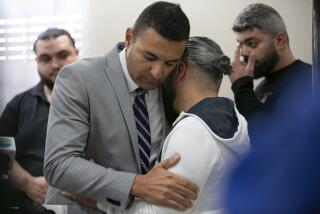Perils of Muslim Rage
- Share via
WASHINGTON — The quick U.S. military victory in Afghanistan and the return to pre-Taliban life there have obscured a dangerous legacy of the conflict: the deep distrust--and in some quarters, outright hostility--that now marks the relationship between the United States and the Muslim world. Unless relations are repaired, the next phase of the U.S. war against terrorism will be imperiled.
The Muslim world’s reaction to the “smoking-gun” tape of Osama bin Laden, in which the terrorist leader gloats about the destruction of the World Trade Center, highlighted the problem. Although a majority of Muslims think Bin Laden orchestrated the attack, significant segments of Muslim public opinion believe the tape to be a fabrication.
This is in keeping with the dominant perception in the Muslim world, rightly or wrongly, that the U.S. is targeting Muslims in its war against terrorism and, accordingly, disproportionately killing Muslims. How the U.S. has fought the war in Afghanistan and other recent conflicts reinforces such beliefs. The U.S. reliance on airpower and high-tech warfare in the Gulf War and in Kosovo resulted in few American combat casualties and a far greater loss of life on the ground, particularly in Iraq. In Afghanistan, Muslim killed Muslim on the ground, and U.S. airpower killed Muslims from above. Again, U.S. casualties have been minimal, while estimates of Muslims killed aren’t publicized for political reasons.
Muslims also feel betrayed in their past relations with Americans. The sudden U.S. withdrawal from South Asia in the late 1980s after the defeat of the Soviet Union raised doubts in Muslim minds about America’s commitment to rebuilding their societies. And as they read the list of future targets in the U.S. war against terrorism, they see Muslim states and societies: Iraq, Somalia, Yemen, Lebanon, Indonesia and areas of the Philippines.
This perception of persecution enrages many Muslims. The Arab press has many examples daily. Respected and mainstream newspapers such as Egypt’s Al Ahram or Saudi Arabia’s Asharq al Awsat are littered with opinion articles fearful of a clash of civilizations between the Christian West and the Muslim East. Even when President Bush endorsed the creation of a Palestinian state, many newspapers in the Muslim world warned against “believing America’s policies.” Commentators counseled their readers to wait and see. Thus far, they seem to be right.
To defeat terrorism, Washington needs to reverse this reflexive distrust of its motives and aims in Muslim and Arab societies. This will require nothing short of a vigorous public diplomacy campaign in the Muslim world, a task greatly complicated by the escalation of violence in the Israeli-Palestinian conflict. Arab public opinion matters, and it is currently very angry at Israel because of its military conduct in the occupied territories and its treatment of Palestinian leader Yasser Arafat.
But the worst move the U.S. could take, one that would surely deepen Muslim distrust of America, would be to attack Iraq, as some advisors of President Bush have urged. In the least, the sustainability of the U.S. anti-terrorism campaign would be seriously jeopardized by such an action.
Make no mistake about it. Saddam Hussein is a menace to both world peace and to the stability of the Middle East. But now is absolutely the wrong moment to attack him because the U.S. must first persuade Arabs and Muslims that hitting Hussein would not be a war on Islam. The key to U.S. victory in Afghanistan was the cooperation of Afghans who detested the Taliban. We need to make new friends in Iraq who loathe Hussein--the U.S.-backed Iraqi opposition was wiped out by Hussein in 1996--and win the support of Arab and Muslim public opinion worldwide. So far, the U.S. has failed to do this.
Mainstream Muslims clearly understood why the United States went to war in Afghanistan to get Bin Laden and Al Qaeda. It was a matter of self-defense. But Iraq has not attacked Americans on U.S. soil. A case can certainly be made that Hussein is a worthy target because his regime has abused its citizens and developed weapons of mass destruction that threaten regional stability. But it is a separate case from the U.S. campaign against terrorism. If the U.S. takes on Iraq in the name of fighting terrorism, many Muslims will be believe it is instead another phase of the war against Islam.
A strong U.S. role in rebuilding Afghanistan will help erase this perception and justify going after Iraq. Washington needs to convince Iraqis that their country can benefit from Hussein’s fall as much as Afghanistan stands to benefit from the defeat of the Taliban. One of the main criticisms of the U.S. anti-terrorism campaign in Afghanistan was that military victory outpaced the politics of creating a sustainable alternative to the Taliban. The slow pace of providing humanitarian aid further complicated the situation. Thus, it is important the U.S. do everything in its power to ensure that the interim government in Afghanistan works well and gains the confidence of Afghans. It is similarly important that Afghans believe that the U.S. is in their country for the long haul. I’m not saying that Kabul should be the city on the hill in Muslim eyes. Rather, if the U.S. wants Muslims to believe that Bin Laden is a force of evil and destruction, it must convince Muslims that America is a force of good. Helping to rebuild Afghanistan will go a long way toward creating such an impression.
America needs the intellectual equivalent of the Northern Alliance, an army of Muslim intellectuals, to fight the war for the hearts and minds of Muslims. Building such support will take time, but if America intends to sustain its campaign against terrorism, it should start courting Muslim and Arab public opinion now. It surely shouldn’t attack another Muslim country.
*
Mamoun Fandy is professor of politics at the Near East-South Asia Center for Strategic Studies at the National Defense University.
More to Read
Sign up for Essential California
The most important California stories and recommendations in your inbox every morning.
You may occasionally receive promotional content from the Los Angeles Times.










